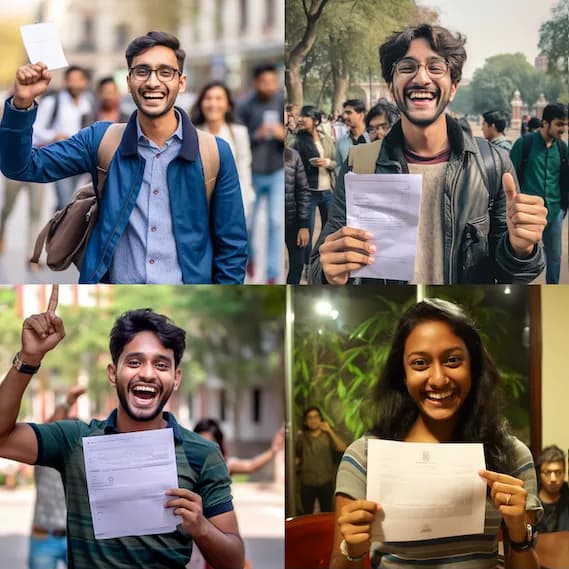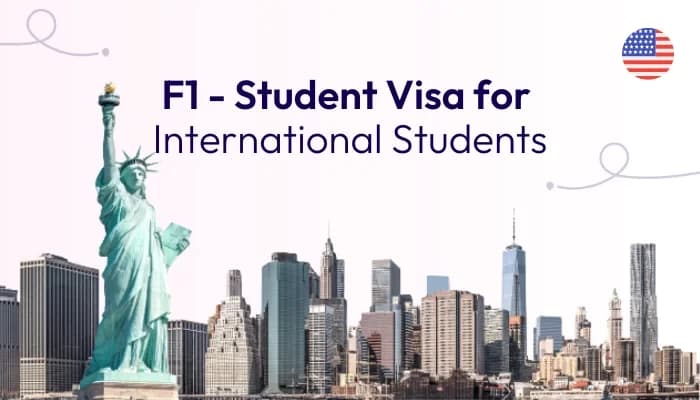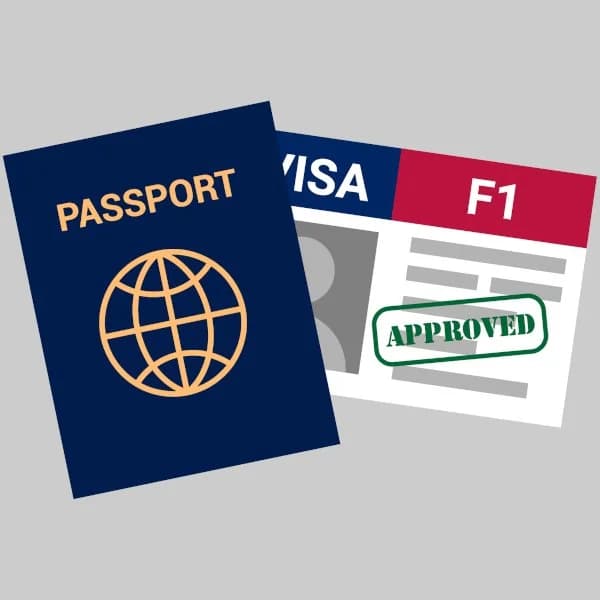Overcome F1 Visa Rejection: Turn Denial to Approval
Key Highlights
- Review your refusal letter carefully to understand the specific reasons for your F1 visa rejection.
- Provide concrete evidence of strong ties to your home country, such as family bonds, job offers, or property ownership.
- Reassess and improve your application, focusing on areas highlighted in your previous refusal.
- Practice for the interview by conducting mock interviews and preparing clear, confident, and honest responses.
- Apply again with a well-prepared application and a positive mindset.
Have you ever walked out of an F1 visa interview feeling uncertain, only to face the disappointment of visa refusal? If you're dreaming of studying in the US, this can feel like a major setback. But don't lose heart! In this detailed guide, I'll walk you through understanding the reason behind your F1 visa rejection, how to address these issues, and steps to increase your chances of approval in your next attempt. Let's dive in!
How to Find or Know Your Reason of F1 Visa Refusal
Getting your F1 visa application refused can be disheartening, but understanding why it happened is the first step towards a successful reapplication. It's not always straightforward to pinpoint the exact reason for your "F1 Visa Rejection", but with some careful analysis and reflection, you can uncover these critical insights. Let's explore a step-by-step guide to help you identify the reasons behind your visa refusal.
Step 1: Review Your Refusal Letter
After your visa interview, if you face a refusal, you will receive a refusal letter. This document is key as it typically specifies the grounds for your "F1 Visa Refusal". Carefully read and analyze this letter. The reasons can range from financial inadequacy to doubts about your study plans.
Step 2: Reflect on Your Interview
Think back to your interview. Were there questions that you found challenging or were unable to answer convincingly? Sometimes, the clues to "F1 Visa Refusal Reasons" lie in the interview conversation. Reflect on how you responded to questions about your study plans, financial status, or future career goals.
Step 3: Seek Feedback
It can be beneficial to discuss your interview experience with friends, family, or academic advisors, especially those who have experience with the F1 visa process. They may offer insights or notice discrepancies in your interview responses that you might have missed.
How Can I Fix the Reason for My F1 Visa Denial?
If you've faced an F1 visa refusal, the key to turning things around lies in effectively addressing the reasons for the rejection. "How do I fix the reason for F1 visa refusal?" is a question many applicants grapple with. By focusing on the specific areas of concern highlighted in your refusal, you can make targeted improvements to enhance your application. Let's delve into a step-by-step approach to fix the reasons for your visa refusal and optimize your chances for a successful reapplication.
Financial Stability
If your application was declined due to financial reasons, it's crucial to provide stronger evidence of your financial stability. This could include updated bank statements showing a more robust financial situation, additional sponsorship letters, or proof of scholarships and funding.
Academic Preparedness
In cases where academic readiness was questioned, take steps to bolster your academic profile. This might involve retaking language proficiency tests or enhancing your academic records. Clearly demonstrate your academic achievements and readiness for the chosen field of study.
Ties to Home Country
A common reason for F1 visa refusal is the suspicion that the applicant might not return to their home country post-studies. Address this by providing concrete evidence of strong ties to your home country, such as family bonds, potential job offers, or property ownership.
How Do I Get F1 Visa Approval on the Next Attempt?
Securing approval for your F1 visa after an initial denial can seem challenging, but with the right approach, it's entirely achievable. The key is to learn from your past experience and to strategically address the issues that led to your previous refusal. Below, I outline a step-by-step guide to enhance your application and increase your chances of success in your next attempt.
Step 1: Reassess and Improve Your Application
Carefully review your entire visa application. Identify areas for improvement, particularly those that were highlighted as reasons for your previous refusal. Make sure every part of your application is clear, concise, and supports your case as a genuine student.
Step 2: Practice for the Interview
Prepare diligently for your interview. Conduct mock interviews with friends, family, or educational advisors. Focus on providing clear, confident, and honest responses. Remember, consistency and authenticity in your answers are critical.
Step 3: Stay Updated and Informed
Keep abreast of the latest visa policies and requirements. Regulations and criteria can change, and being informed can make a significant difference in your preparation.
Step 4: Apply Again
When you feel confident and have addressed the previous refusal's reasons, it's time to reapply. Approach this attempt with a positive mindset and a well-prepared application.
Sample Success Stories: Turning F1 Visa Refusals into Approvals
Let's look at some scenarios:
Scenario 1: Anjali from India - Academic Gaps Addressed
Anjali, an applicant from India, faced refusal due to gaps in her academic history. For her second attempt, she provided a comprehensive explanation for these gaps, backed by documentation of her involvement in family business during that time. Additionally, she included new letters of recommendation from her professors, which emphasized her commitment and potential as a student. This thorough approach effectively addressed the concerns of the visa officers, leading to the approval of her visa.
Scenario 2: Kofi from Ghana - Stronger Ties to Home Country
Kofi's application from Ghana was initially refused because the officers were not convinced of his intention to return after his studies. To address this, Kofi included in his reapplication evidence of his strong family ties in Ghana and a letter from a potential employer indicating a job offer upon his return. He also showed his involvement in community projects in Ghana, highlighting his commitment to contribute to his home country. These additions to his application were successful in demonstrating his intent to return, resulting in a visa approval.
Scenario 3: Aisha from Nigeria - Overcoming Miscommunication
Aisha from Nigeria initially received a refusal due to a miscommunication during her interview regarding her study plans. For her second attempt, she focused on clearly articulating her academic goals and how they align with her future career plans in Nigeria. She also took additional public speaking courses to boost her communication skills. Her improved clarity and confidence in the interview were key factors in the approval of her visa.
Scenario 4: Tanvir from Bangladesh - Clarifying Financial Stability
Tanvir’s visa was initially refused due to doubts about his financial stability. For his reapplication, he included more detailed bank statements and secured a financial guarantor. He also provided proof of his family's assets in Bangladesh to further establish his financial base. This comprehensive financial evidence successfully addressed the concerns about his ability to finance his education in the US, leading to his visa being approved.
Scenario 5: Sita from Nepal - Addressing Visa Interview Performance
Sita from Nepal faced refusal initially due to a lack of confidence and unclear responses during her visa interview. To prepare for her next attempt, she engaged in mock interviews and worked on her English proficiency. She also prepared detailed answers to potential questions about her study plans and reasons for choosing a specific university in the US. Her improved interview performance showcased her determination and clarity of purpose, resulting in a successful visa approval.
Conclusion:
So, there you have it – a comprehensive guide to not just understanding but also overcoming F1 visa refusals. Remember, a denial isn't the end of your dream to "Study in the US". It's a chance to reassess, refine, and reapply with a stronger, more convincing case.
From scrutinizing your refusal letter to practicing for a more compelling interview, each step is an opportunity to edge closer to your goal. The real-life examples from students across the globe, like Anjali from India or Kofi from Ghana, illustrate that with the right approach and improvements, visa approval is within reach. So, keep your spirits high, work on your application diligently, and prepare to present your best self. Your journey to becoming an international student in the United States is still very much on track! 🌟🎓🇺🇸
Have Questions About This Topic?
Join our community to get personalized advice and share experiences with others going through similar visa processes.





